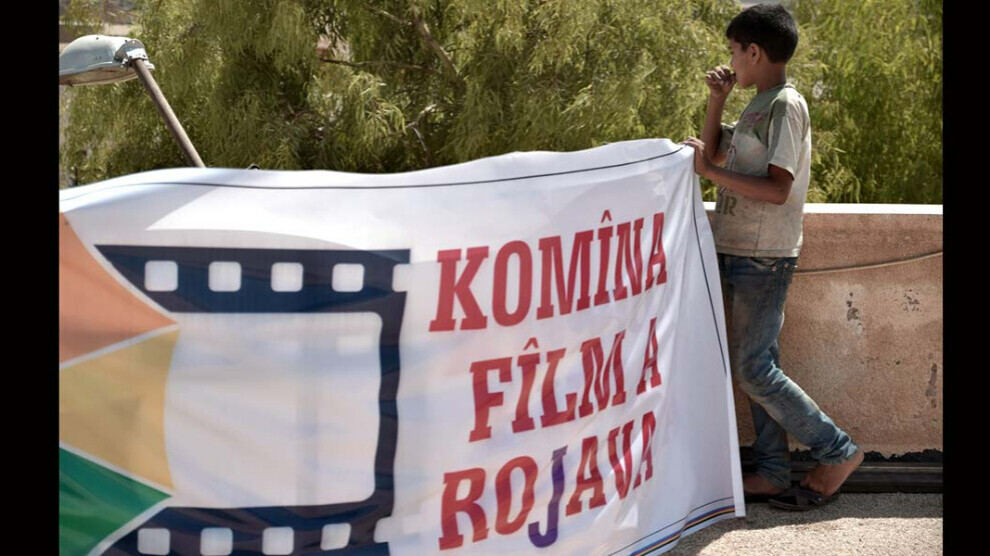Rojava Film Commune: 7 years reflecting the Rojava Revolution
Despite the attacks, the Rojava Film Commune has produced many films since 2015. The Commune is constantly working to become the language of the Rojava Revolution.
Despite the attacks, the Rojava Film Commune has produced many films since 2015. The Commune is constantly working to become the language of the Rojava Revolution.

The Rojava Film Commune did not fail to play the role of the mirror of the resistance living in Sur, Şengal and Kobanê, in addition to its efforts to become the language of the revolution and it accomplished the difficult task in the short time of 7 years.
The Rojava Film Commune was established in Dirbesiyê in 2015. In order to disseminate the cinema culture, it first started with the work of an academy. The Rojava Film Commune, opened the Martyr Yekta Herekol Academy, to train people in cinema.
The Martyr Yekta Herekol Academy trained many filmmakers and was eventually closed due to Turkish state attacks. The Rojava Film Commune then began to open weekly or monthly training sessions on different topics according to the needs and requests. Martyr Yekta Herekol Academy, which was suspended after the attacks, was then reopened.
The Rojava Film Commune produced 11 films in the first year of the Martyr Yekta Herekol Academy and 7 films in the next year. They also produced the films 'Bajarên Wêranbûyi' and 'Ji Bo Azadiye'. The post production of the movie about the Kobanê resistance is currently underway.
The Rojava Film Commune also started to work on a couple of series in 2019.
Three Communes
The Afrin Film Commune was established with the first graduates of Martyr Yekta Herekol Academy, but after the Turkish occupation of the region of Afrin, the Commune was moved to Shehba.
The Kobanê Film Commune was established in 2018.
A dubbing studio was opened in Serêkaniyê, but due to the Turkish invasion that started in 2019, the team continues its work in Qamishlo.
The Rojava Film Commune is organized according to the project and its needs. Thus it determines the place, time and place according to both the number of members and the needs of the project. There are communes in Shehba, Kobanê and Cizîre Region, which are affiliated to Rojava Film Commune, which in turn is part of TEV-ÇAND, the cultural umbrella organisation in North and East Syria.
There are Script, Production and Diplomacy Committees in the Rojava Film Commune, but these committees can also change according to the needs of the project.
The Rojava Film Commune is affiliated to TEV-ÇAND in terms of budget, and sometimes delivers its projects to the public with the support of the Ministry of Culture and Arts.
Preparations in Raqqa and Tabqa
Because the Commune has not been established for a long time and the Kurdish people have a greater interest in cinema, most of the members of the Rojava Film Commune are Kurds, but other peoples are also involved in the various projects. Both Turkish and international filmmakers took part in the construction of the Rojava Film Commune.
The Rojava Film Commune, the founder of the Rojava Film Festival, which has been going on for 5 years, is making preparations to establish a film commune in Raqqa and Tabqa. The Rojava Film Commune members do not need to have studied cinema and are voluntary.
The Rojava Film Commune did not fail to play the role of the mirror of the resistance living in Sur, Şengal and Kobanê, in addition to its efforts to become the language of the revolution in its 7 years of life.
A production of 25 films
The Rojava Film Commune has produced 25 films so far, and has carried out all its work in Rojava, including post-production, except for three of these films.
Cinema cannot be detached from the revolution
Sêvînaz Evdikê, a director who studied cinema, and a member of the Rojava Film Commune, said: “I never thought of taking part in a film that did not reflect the revolution and was disconnected from it, nor did I have such a desire. The Rojava Film Commune was the best and most suitable space for me. I chose the cinema because I love it, but I could not take part in a film detached from the revolution. When both cinema and the revolution became a whole, my interest in cinema increased even more.”